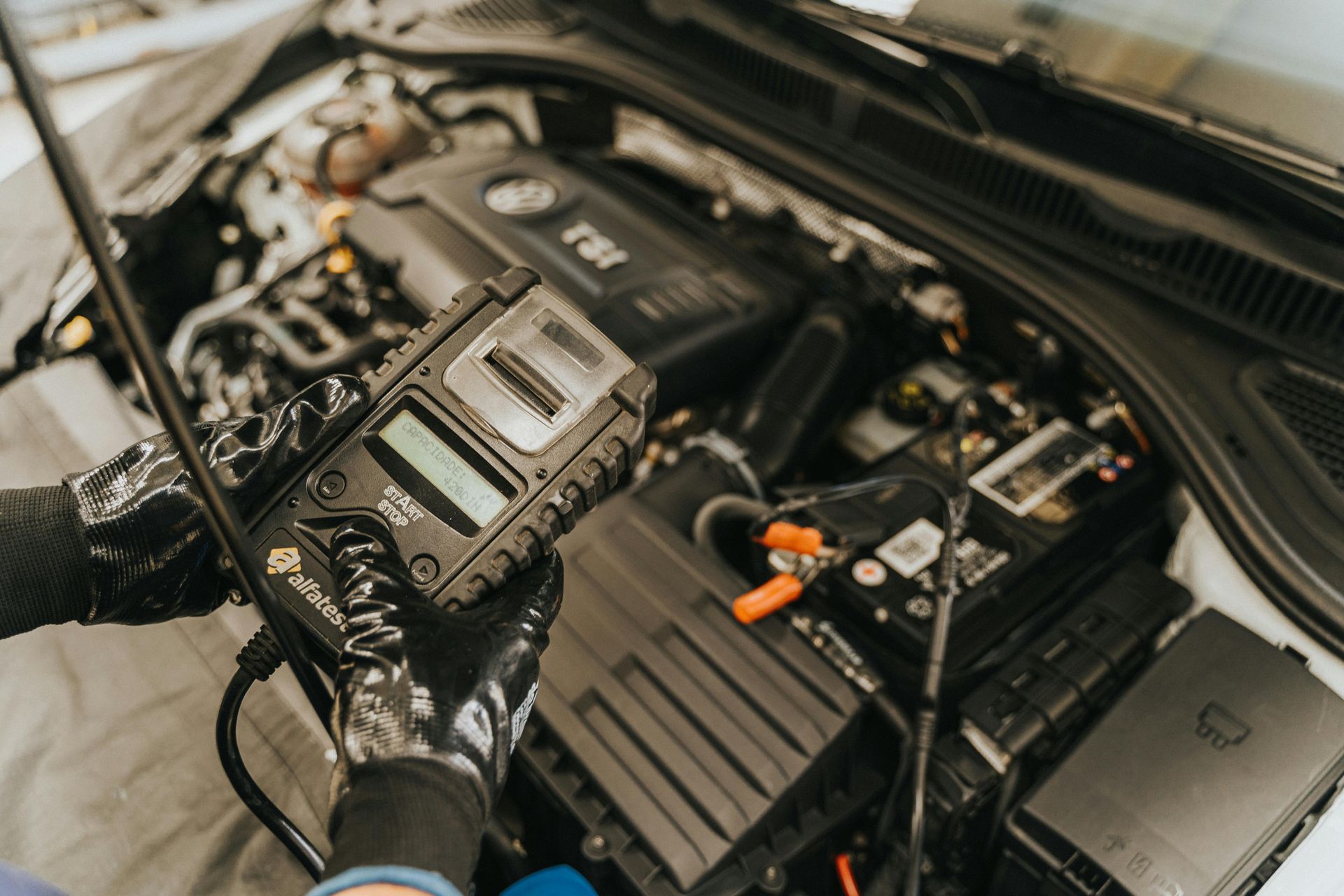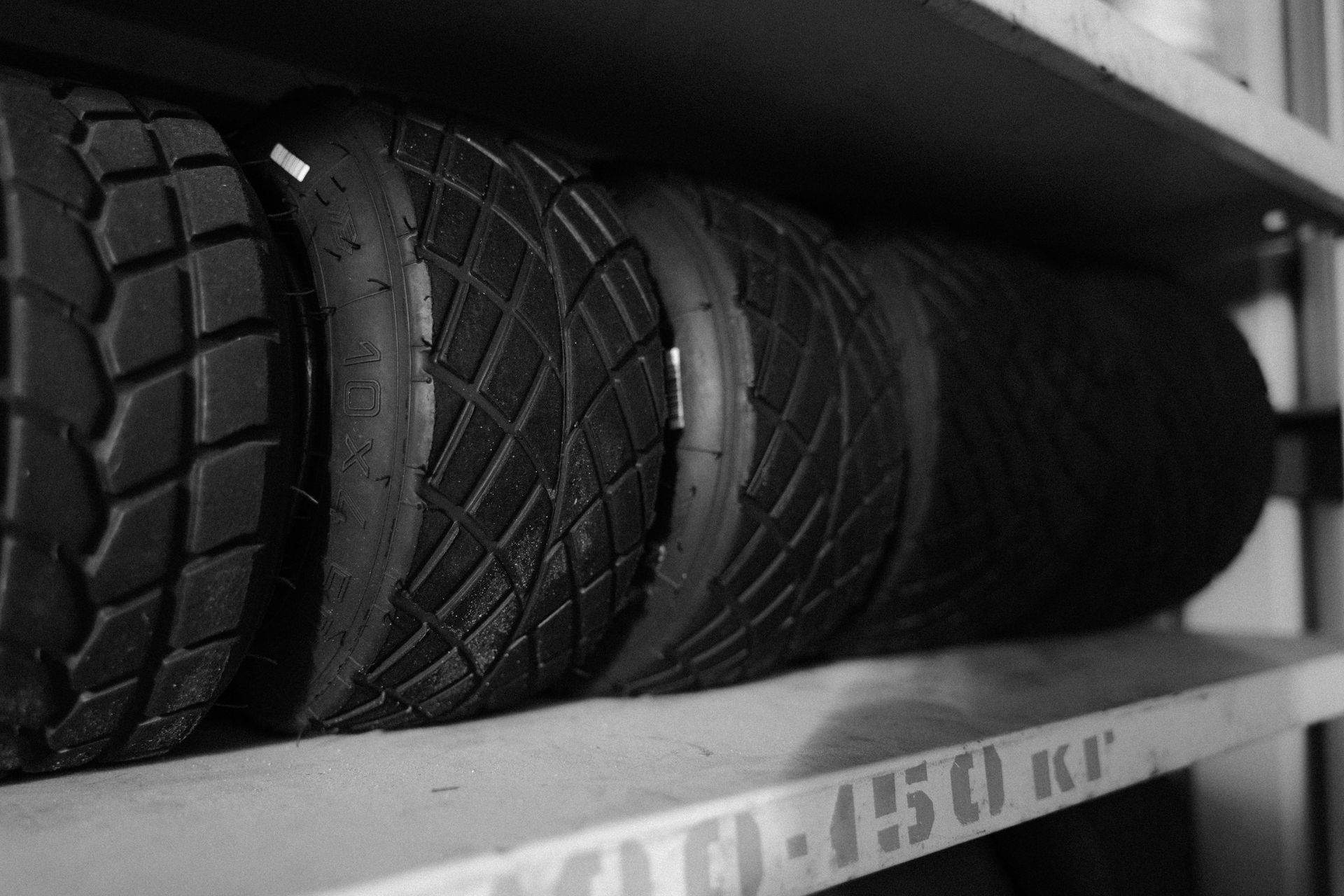Mon - Fri: 7:30 AM - 5:30 PM
Sat - Sun: Closed
4444 Reviews
How to Check If Your Car Battery is Still Good: A Simple Guide by inMOTION Auto Care in Lincoln, NE
When it comes to vehicle maintenance, your car’s battery is one of the most critical components to monitor. A healthy battery ensures your vehicle starts without trouble, powers electrical components, and keeps you on the road. But how do you know when your battery needs attention? In this blog post, we’ll walk you through simple and effective ways to check if your car battery is still good. At inMOTION Auto Care in Lincoln, NE, we are committed to helping you keep your vehicle in top shape, and that includes understanding how to care for your car’s battery.
Why is Your Car’s Battery So Important?
Before we dive into the steps for checking your battery, it’s essential to understand why your car battery matters. A battery is the powerhouse that provides the initial charge to start your engine and keeps electrical systems running. Without a properly functioning battery, your car may not start, and critical functions such as power windows, lights, and infotainment systems could fail.
At inMOTION Auto Care, we see a wide range of battery-related issues, from dead batteries to underperforming ones, and we know that catching these problems early can save you time and money in the long run. Regularly checking your battery’s health is part of proactive car maintenance, ensuring you're not left stranded with a dead car battery.
Signs Your Battery May Be Failing
Before we dive into the steps of checking your battery, let’s discuss the common signs that indicate your battery might be on its way out:
Slow Engine Crank: If your engine is taking longer than usual to start, it could be a sign that your battery is weakening. A healthy battery provides a strong burst of energy to turn the engine over. If it’s not working as efficiently, the cranking process will be slower.
Dim Lights: If your headlights or dashboard lights appear dimmer than usual, it could indicate that your battery isn’t providing enough power to run these components effectively.
Check Engine or Battery Warning Light: Modern vehicles come equipped with a dashboard warning light that indicates issues with the battery or charging system. If this light comes on, it’s important to take action and have your battery checked as soon as possible.
Corrosion or Leaks: Inspect the battery terminals for any visible corrosion (a white, ashy substance) or leaks around the battery. This is a sign of a failing battery or other electrical issues.
Age of the Battery: Car batteries typically last between 3 and 5 years. If your battery is near or past that mark, it’s time for a checkup. Even without obvious signs of failure, older batteries are prone to issues.
Step-by-Step Guide: How to Check if Your Battery is Still Good
At inMOTION Auto Care, we recommend regular battery checks as part of your routine vehicle maintenance. Here’s a simple guide you can follow to determine if your battery is still in good shape:
1. Check for Corrosion or Leaks
Start by visually inspecting the battery. Look for signs of corrosion around the terminals, which could affect your battery’s performance. If you see corrosion, cleaning it with a mixture of baking soda and water can help improve the battery’s connection. If the corrosion persists, or if there are any visible leaks, it's time to replace the battery.
2. Perform a Voltage Test
One of the most reliable ways to check a car battery’s health is to test its voltage. A healthy, fully charged battery should read between 12.6 and 12.8 volts when the engine is off. To perform this test, you’ll need a multimeter. Here’s how to use it:
Set the multimeter to DC voltage (V) and place the red probe on the positive terminal and the black probe on the negative terminal.
Read the multimeter display. If the voltage is 12.6V or higher, the battery is likely in good condition. A reading below 12.4V suggests your battery is undercharged, and below 12.0V could indicate a dying battery.
If you’re unsure about performing this test yourself, don’t hesitate to visit us at inMOTION Auto Care in Lincoln, NE. Our team of professionals can help you assess your battery’s health quickly and efficiently.
3. Test the Charging System
Even if your battery seems fine at first glance, a faulty alternator can lead to undercharging and premature battery failure. You can test the charging system with a multimeter by measuring the voltage while the engine is running. A healthy alternator should produce between 13.7 and 14.7 volts while the car is on.
4. Listen for Odd Noises
When starting your vehicle, listen for any unusual sounds such as clicking noises or a grinding sound. A clicking noise can mean that your battery doesn’t have enough charge to start the engine, while a grinding noise may indicate a more severe issue with the starter motor.
5. Look for a Foul Smell
If you notice a rotten egg smell (like sulfur) coming from your battery, it could be a sign of a leaking or overcharged battery. This is a serious issue and should be addressed immediately to avoid further damage to your vehicle.
6. Test Battery Load
Another test to check battery health is a load test. This involves applying a small load to the battery to see how it performs. A battery that shows a significant drop in voltage during the load test may not be able to deliver enough power, even if it appears fine when the engine is off.
What to Do If Your Battery is Failing
If your battery is showing signs of failure, there are a few options to consider:
Battery Replacement: If your battery is older or failing and can no longer hold a charge, it’s best to replace it with a new one. Be sure to choose a battery that’s compatible with your car’s specifications.
Battery Charging: If the battery is simply undercharged, you may be able to restore it with a jump-start or by charging it using a battery charger.
Visit inMOTION Auto Care: If you’re unsure about the health of your battery or need professional help with a battery check, our team at inMOTION Auto Care in Lincoln, NE is here to help. We offer comprehensive battery testing, replacement, and advice to ensure your vehicle runs smoothly.
Regular Battery Maintenance Tips
To prolong the life of your car’s battery, here are a few tips to keep it in optimal condition:
Keep the Terminals Clean: Regularly clean the battery terminals and apply a thin layer of petroleum jelly to prevent corrosion.
Turn Off Electronics When Not in Use: Avoid leaving lights, radio, or other electrical systems on when the engine is off.
Test Your Battery Twice a Year: Conduct a simple battery test in the spring and fall to ensure it’s working well before extreme weather conditions.
Park in a Garage: If possible, park your car in a garage to avoid extreme temperature fluctuations, which can affect battery life.
Conclusion
At inMOTION Auto Care in Lincoln, NE, we believe in keeping your vehicle’s battery in the best possible shape to ensure reliable performance. Regular checks and maintenance can prevent sudden battery failure and keep you from getting stuck. If you notice any signs that your battery is on its way out or simply want a professional opinion, don’t hesitate to reach out to our team. We’re here to help you with all your automotive needs, from battery tests to complete vehicle maintenance.
Schedule an appointment with us today at inMOTION Auto Care and keep your car running smoothly!
Visit Our Shop in Lincoln, NE
Family-owned and locally rooted, inMOTION Auto Care delivers trusted automotive services in Lincoln, NE, with a commitment to excellence and community values.
inMOTION Auto Care
Mon - Fri: 7:30 AM - 5:30 PM
Sat - Sun: Closed
Services
List of Services
-
Brake Repair ServicesBrake Repair Services
-
Oil & Filter ChangesOil & Filter Changes
-
Air Conditioning RepairsAir Conditioning Repairs
-
Wheel AlignmentWheel Alignment
-
Battery ReplacementBattery Replacement
-
Transmission RepairTransmission Repair
-
Tire ServicesTire Services
-
Engine Diagnostics and RepairEngine Diagnostics and Repair
List of Services
-
Brake Repair ServicesBrake Repair Services
-
Oil & Filter ChangesOil & Filter Changes
-
Air Conditioning RepairsAir Conditioning Repairs
-
Wheel AlignmentWheel Alignment
-
Battery ReplacementBattery Replacement
-
Transmission RepairTransmission Repair
-
Tire ServicesTire Services
-
Engine Diagnostics and RepairEngine Diagnostics and Repair
Services
List of Services
-
Brake Repair ServicesBrake Repair Services
-
Oil & Filter ChangesOil & Filter Changes
-
Air Conditioning RepairsAir Conditioning Repairs
-
Wheel AlignmentWheel Alignment
-
Battery ReplacementBattery Replacement
-
Transmission RepairTransmission Repair
-
Tire ServicesTire Services
-
Engine Diagnostics and RepairEngine Diagnostics and Repair
List of Services
-
Brake Repair ServicesBrake Repair Services
-
Oil & Filter ChangesOil & Filter Changes
-
Air Conditioning RepairsAir Conditioning Repairs
-
Wheel AlignmentWheel Alignment
-
Battery ReplacementBattery Replacement
-
Transmission RepairTransmission Repair
-
Tire ServicesTire Services
-
Engine Diagnostics and RepairEngine Diagnostics and Repair




© 2024 inMOTION Auto Care. All Rights Reserved | Website managed by Shopgenie



